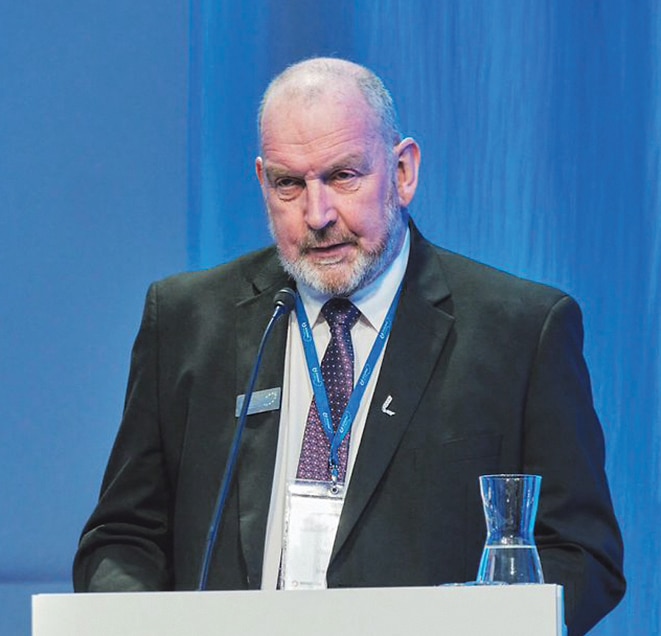As we approach the inaugural World Lewy Body Dementia Day on January 28, Kevin Quaid, who was diagnosed with Lewy body dementia in 2017 after a previous diagnosis of Parkinson’s Disease, tells Mary O’Brien why he wants people who have dementia to be less afraid of the disease and Iracema Leroi, a professor in geriatric psychiatry at Trinity College and consultant psychiatrist at St. James’s Hospital in Dublin shares news of funding for a new programme to increase the quality of diagnosis and care for people with Lewy body dementias.

Kevin Quaid speaking at the Alzheimer Europe Conference in 2023.
“We have to stop the fear and the stigma,” says Kevin passionately. “People have symptoms and yet they’re afraid to go and get a diagnosis, instead lying awake at night wondering what they have.”
Kevin is Chair of The Alzheimer Society of Ireland’s Irish Dementia Working Group; Vice-Chair of the Alzheimer Europe European Working Group of People with Dementia and the founder of Lewy Body Ireland. He has written two books about his experiences with Dementia, titled ‘Lewy Body Dementia, Survival and Me’ and ‘I am KEVIN not Lewy’ and is currently working on his third.
He stresses the importance of having a name for your dementia so a plan can be put in place. “There is no such thing as just a touch of dementia…a shot in the dark is just not good enough,” says Kevin.
There are over 200 subtypes of dementia with the most common including Alzheimers – one in nine people over the age of 65 or older – followed by Lewy body dementia, vascular, and mixed dementia. According to international dementia statistics, someone in the world develops dementia every three seconds and it’s estimated that there are up to 10,000 people living with Lewy body dementia in Ireland.
The cause of Lewy body dementia is not known but it gets its name from a build-up of protein in brain cells called ‘Lewy bodies’ which are also seen in the brains of people with Parkinson’s disease. Many people with Parkinson’s eventually develop problems with thinking and reasoning, and many people with Lewy body dementia experience movement symptoms. While Lewy body dementia is the second most common type of dementia, it is frequently un- or misdiagnosed, as it can present in multiple forms. Lewy body dementia and Parkinson’s disease dementia together account for up to 15 per cent of all dementias and people living with these types of dementia can often fall through gaps in care.
Some of the most common symptoms of Lewy body dementia are problems with thinking, visual hallucinations, parkinsonism, sleep issues and autonomic symptoms including a drop in blood pressure, incontinence and constipation
Professor Iracema Leroi is the co-lead on the Dementia Trials Ireland team that has just been awarded funding by Ireland’s Health Research Board for a four-year program grant to increase the quality of diagnosis and care for people with Lewy body dementias. The team hopes that this will result in a steep change in support for individuals, their families, as well as the health system.
Professor Leroi runs a Mind and Movement Clinic, specialising in the mental and cognitive health of people with Parkinson’s-related disorders who have progressed to the dementia stage at St James’ Hospital in Dublin.
“We want to try to raise awareness, understanding and knowledge around Lewy body dementia at all tiers within the medical system, particularly in secondary care and memory clinics so that people get an accurate diagnosis earlier on,” she says.
For Kevin, there were a number of red flags with his health, starting with severe blood pressure problems in his mid-forties and progressing to problems like a lack of spatial awareness before his diagnosis at age 53. A DaTscan, which looks at the function of dopamine transporters in the brain, eventually confirmed a clinical diagnosis of Lewy body dementia.
Kevin says that while he wasn’t fitting the criteria for Lewy body dementia at the time, he developed a number of new symptoms very quickly. “My hallucinations and night terrors got worse and I developed sleep apnea. I also had to stop driving, as I couldn’t judge distance anymore and I was seeing cars and people that weren’t there at all.”
“It’s terrifying for people who don’t know what’s happening to them,” he continues. “I’m twenty stone and six foot one. Can you imagine waking up at night after dreaming you murdered someone in your sleep and not knowing who or where you are or who is alongside you in the bed. It was only my wife Helena’s voice that would bring me back.
“And it’s a lot easier living with the disease than living alongside it,” he shares. “As a family, we have discussed everything, from when I might need to go into a care home to power of attorney to funeral arrangements.”
Kevin is eight years into the disease after his diagnosis and says he has good and bad days. He was diagnosed recently with polymalgia, a condition that causes pain and muscle stiffness.
He says something that has been life-changing was getting his hearing checked six months ago. “I can’t put into words the difference this had made to my life,” he shares. “Before the hearing aids, I had to have white noise on in the background all the time to try to drown out the constant buzzing sound in my head. Since getting the hearing aids, I can just sit quietly.”
Acquired hearing impairment in middle age is one of the well-recognised risk factors for developing dementia in later life.
Professor Leroi is the Chief Investigator for the EU-funded SENSE-Cog programme, which aims to understand the links among hearing, vision and cognitive impairment in older people and is investigating whether hearing and vision enhancement improves outcomes for people with dementia.
“A hearing impairment can diminish a person with dementia’s ability to absorb information, which will also impact on their ability to remember, so if you already have diminished cognition that’s going to be exaggerated,” explains Professor Leroi.
“As dementia progresses, hearing impairment can start to impact on care partners and be associated with social isolation, lower quality of life and may even hasten progression.”
Kevin’s new book delves into how the arts, music in particular, can help someone with Lewy body dementia.
“There is so much anecdotal evidence that shows how things like choirs and group activities can be transformative for someone living with dementia in so many ways – the impact of music on the brain or the fact that people might not remember your name but can remember the words to a song,” says Professor Leroi. “It also gives a great sense of empowerment and community and some people with dementia have really embraced that.”
A 2020 landmark report from the Lancet Commission supports 12 potentially modifiable risk factors for dementia: These include less education, hypertension, hearing impairment, smoking, obesity, depression, physical inactivity, diabetes, low social contact, excessive alcohol consumption, traumatic brain injury, and air pollution. The report says that “Together the 12 modifiable risk factors account for around 40 per cent of worldwide dementias, which consequently could theoretically be prevented or delayed. The potential for prevention is high.”
“Essentially the message is healthy heart, healthy brain, plus eliminate the factors listed by the Lancet report,” says Professor Leroi.
“You can’t change your age, your genetics or the pathology but you can change things that might make the disease worse like blood pressure, social isolation, depression and so on.”
“You change your plans, the course of your road, but you don’t give up,” says Kevin.
Kevin received an Honorary Doctorate of Business Administration from Longford College last November. The Doctorate awarded through Rushford Business School acknowledges Kevin’s outstanding contributions to the field of Lewy body dementia advocacy, specifically through the values of innovation, leadership, and a commitment to public service.
For more information on Lewy Body Dementia or other types of dementia visit lewybodyireland.org, alzheimer.ie and dementia.ie.
‘Lewy Body Dementia Survival and Me’ and ‘I am KEVIN! not Lewy’ by Kevin Quaid are available to purchase on Amazon.


